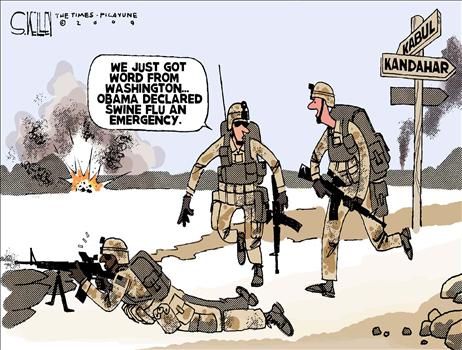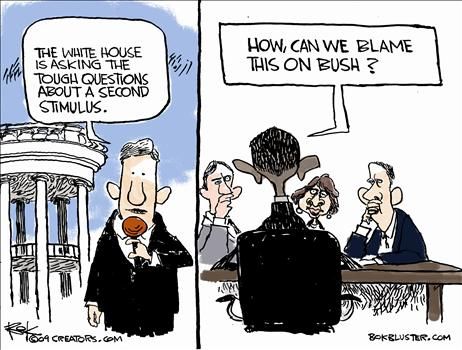
 You might be a redneck if your mama can cuss out a cop without taking the cigarette outa her mouth ... and you might be a President dithering endlessly about whether to send needed troops to fight the war in Aghanistan if even a Washington Post columnist says we need more troops there.
You might be a redneck if your mama can cuss out a cop without taking the cigarette outa her mouth ... and you might be a President dithering endlessly about whether to send needed troops to fight the war in Aghanistan if even a Washington Post columnist says we need more troops there.David Ignatius says exactly that following his recent trip to Afghanistan, which I might point out President Obama not only hasn't done lately, much less consult with the general in charge there.
So what should Obama do? I think he should add enough troops to continue the mission he endorsed in March to "reverse the Taliban's gains" and improve security in Afghanistan's population centers. I don't know whether the right number is the roughly 40,000 that Gen. Stanley McChrystal has recommended, but it should be the minimum number necessary. The additional troops will come at a steep political price, at home and abroad.Sir Charles Krauthammer shares an old Soviet joke to characterize Obama's dithering strategy.

WASHINGTON -- Old Soviet joke:
Moscow, 1953. Stalin calls in Khrushchev.
"Niki, I'm dying. Don't have much to leave you. Just three envelopes. Open them, one at a time, when you get into big trouble."
A few years later, first crisis. Khrushchev opens envelope 1: "Blame everything on me. Uncle Joe."
A few years later, a really big crisis. Opens envelope 2: "Blame everything on me. Again. Good luck, Uncle Joe."
Third crisis. Opens envelope 3: "Prepare three envelopes."
In the Barack Obama version, there are 50 or so such blame-Bush free passes before the gig is up. By my calculation, Obama has already burned through a good 49. Is there anything he hasn't blamed George W. Bush for? The economy, global warming, the credit crisis, Middle East stalemate, the deficit, anti-Americanism abroad -- everything but swine flu.
It's as if Obama's presidency hasn't really started. He's still taking inventory of the Bush years. Just this Monday, he referred to "long years of drift" in Afghanistan in order to, I suppose, explain away his own, well, yearlong drift on Afghanistan.
Krauthammer also sums up Obama's choices on Afghanistan as being remarkably similar to the right decision that his much-hated predecessor President George W. Bush made on Iraq.
In Iraq, the heavy footprint -- also known as the surge -- dramatically reversed the fortunes of war. In Afghanistan, where it took longer for the Taliban to regroup, the failure of the light footprint did not become evident until more recently when an uneasy stalemate began to deteriorate into steady Taliban advances.
That's where we are now in Afghanistan. The logic of a true counterinsurgency strategy there is that whatever resentment a troop surge might occasion pales in comparison with the continued demoralization of any potential anti-Taliban elements unless they receive serious and immediate protection from U.S.-NATO forces.
In other words, Obama is facing the same decision on Afghanistan that Bush faced in late 2006 in deciding to surge in Iraq.
In both places, the deterioration of the military situation was not the result of "drift," but of considered policies that seemed reasonable, cautious and culturally sensitive at the time, but ultimately turned out to be wrong.
Which is evidently what Obama now thinks of the policy choice he made on March 27.
He is to be commended for reconsidering. But it is time he acted like a president and decided. Afghanistan is his. He's used up his envelopes.
The "heavy footprint vs. light footprint" debate is essentially the Pentagon, the generals in charge of our troops and even Defense Sec. Bill Gates vs. "Generals" John Kerry and Joe Biden.
Rich Lowry at National Review calls it the City Mouse, Country Mouse Strategy.
Reading the tea leaves, it appears that defense, state, and the intelligence community has concluded that the Taliban is dangerous and it can't be fought effectively without something like McChrystal's 40,000 troops. The politicos, though, seem to want to turn the process on its head. The original idea was to come up with the strategy and ends first, then decide on what troop levels are necessary. The political aides seemingly want to come up with the most politically palatable troop number — say splitting the difference at 20,000 — and then ask what strategy can be supported with that number. The White House has given the impression of wanting to rig the process against McChrystal, but of failing as the facts — reflected in the positions of defense, et. al — lean the other way.
God save our nation and especially our troops in harm's way while Obama endlessly dithers.















No comments:
Post a Comment